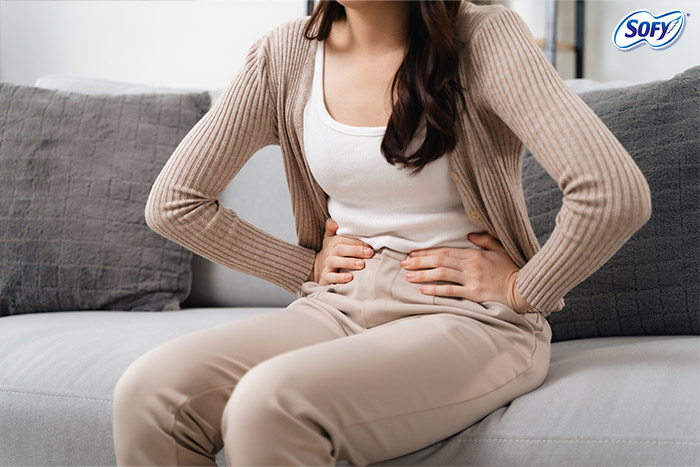Period cramps are the worst. That dull ache, the stabbing pain, the “why-does-my-uterus-hate-me” feeling… yeah, we’ve all been there. But what if your period pain is more than just regular cramps? What if your body waving a giant red flag, telling you something’s up? Let’s break down when period pain is not just period pain.
1. Your cramps are so bad they ruin your life
We’re talking can’t-get-out-of-bed, cancel-all-plans, sobbing-on-the-floor kind of pain. Some discomfort is normal, but if your cramps feel like you’re being stabbed from the inside, that’s not okay.
Possible culprit: Endometriosis or adenomyosis. These are conditions where the tissue that normally lines your uterus decides to grow where it shouldn’t (like outside the uterus or into its walls). The result? Pain that laughs in the face of painkillers.
No matter how intense your period is, you always want to stay fresh and protected. That’s where SOFY’s AntiBacteria range comes in—keeping your skin dry, irritation-free, and feeling clean all day long.
2. Your period lasts way longer than a week
A normal period should wrap up in about 4-7 days. If yours goes on like an unwanted guest who refuses to leave, that’s a red flag.
Possible culprit: Uterine fibroids or hormonal imbalances. Fibroids are non-cancerous growths in the uterus that can cause super heavy and long periods. And if your hormones are out of whack, your cycle might be, too.
3. Your flow is like a murder scene
Soaking through a pad or tampon in an hour? Passing clots bigger than a coin? Feeling dizzy because you’ve lost so much blood? That’s not just a “heavy flow”—that’s your body telling you something’s wrong.
Possible culprit: PCOS (Polycystic Ovary Syndrome) or bleeding disorders. PCOS messes with ovulation, which can lead to crazy heavy, or irregular periods. Some bleeding disorders can also make your flow intense.
If you do have a heavier flow, using the right period product helps a lot. The SOFY Bodyfit range is designed for heavy-flow days, keeping you protected and leak-free while you deal with other things (like cramps, ugh).
4. You have pain even when you’re not on your period
Period pain should come and go with your period. If you’re cramping in between cycles or after sex, something’s up.
Possible culprit: Pelvic inflammatory disease (PID) or ovarian cysts.
5. You have spotting or weird discharge between periods
A little spotting here and there? Okay, maybe. But frequent spotting, unusual discharge, or bleeding after sex? Not so normal.
Possible culprit: Cervical infections or even early signs of something serious, like cervical cancer.
For those in-between days when you’re not sure what’s happening down there, SOFY Pantyliners are a lifesaver. They keep you fresh and dry when discharge is doing its own thing.
Final Words
If any of these warning signs sound familiar, don’t hesitate to see a doctor. Your period shouldn’t feel like a monthly battle for survival! And while you’re at it, make sure you’re using the right period products for your needs. Take care of yourself, queen! And if your cramps are screaming louder than your group chat, don’t ignore them. Your body deserves love, care, and the right kind of attention.
FAQ’s
2. When should I be concerned about my period cramps?
You should consult a healthcare provider if your cramps are so severe that they disrupt your daily activities, last longer than usual, or are accompanied by other symptoms like heavy bleeding, nausea, or fever. These could indicate underlying conditions such as endometriosis or uterine fibroids.
3. What is endometriosis, and how does it relate to period cramps?
Endometriosis is a condition where tissue similar to the uterine lining grows outside the uterus, leading to severe menstrual cramps, chronic pelvic pain, and potential fertility issues. The pain often begins before menstruation and may persist even after the period ends.
4. Can uterine fibroids cause abnormal period pain?
Yes, uterine fibroids are non-cancerous growths in the uterus that can cause heavy menstrual bleeding, prolonged periods, and intense cramping. Symptoms may include pelvic pressure, frequent urination, and back pain.
5. What is adenomyosis, and how does it affect menstruation?
Adenomyosis occurs when the tissue that normally lines the uterus grows into its muscular walls, leading to heavy and painful periods, prolonged menstruation, and chronic pelvic pain. The pain often worsens over time and may not respond well to standard pain relief methods.
6. Are there other conditions that can cause severe period pain?
Yes, conditions like pelvic inflammatory disease (PID), cervical stenosis, and certain infections can lead to abnormal menstrual pain. Symptoms may include fever, foul-smelling discharge, painful intercourse, and pain during urination.
7. How can I differentiate between normal and abnormal period pain?
Normal period pain is typically mild to moderate and subsides within a few days. Abnormal pain is severe, persistent, and may be accompanied by other symptoms like heavy bleeding, nausea, or fever. If pain interferes with daily activities or worsens over time, it's important to seek medical advice.
8. What treatments are available for severe period pain?
Treatment options include over-the-counter pain relievers, hormonal therapies, and in some cases, surgical interventions. The choice of treatment depends on the underlying cause of the pain and should be discussed with a healthcare provider.
9. Can lifestyle changes help manage period pain?
Yes, regular exercise, a balanced diet, stress management, and adequate sleep can help reduce the severity of period pain. Additionally, applying heat to the pelvic area and practicing relaxation techniques may provide relief.
10. When should I consult a healthcare provider about my period pain?
Consult a healthcare provider if your period pain is severe, persistent, or accompanied by other symptoms like heavy bleeding, nausea, fever, or pain during intercourse. Early diagnosis and treatment can help manage underlying conditions and improve quality of life.

